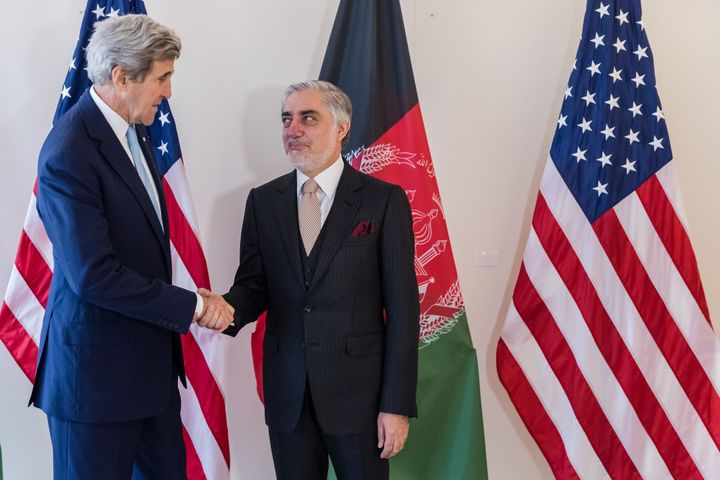Relations between Afghanistan and the U.S. are better than ever, Afghan Chief Executive Abdullah Abdullah said Friday at the Council on Foreign Relations.
“Coordination between us and our international partners is much better than any other time before,” he said. “The spirit of partnership … has changed positively. Today it is collegial. It is very much friendly.”
Abdullah occupies an office that was created for him following months of political confusion when the 2014 national election failed to determine who would succeed former President Hamid Karzai. Abdullah, a doctor who fought against the Soviets during the Cold War, and his main competitor in the election, Ashraf Ghani, a former World Bank official, both claimed victory. It seemed at the time that the dispute would condemn the country to further chaos and conflict.
But in September of last year, after weeks of negotiations brokered by American diplomats, the two presidential candidates agreed to form a unity government. Ghani would become president and Abdullah took on a new role as his chief executive.
A year later, despite initial fears that the two Afghan leaders wouldn’t be able to work well together or with the international community, the unity government is fully functioning, Abdullah said Friday.
“Now the international community is faced with a partner that is a willing partner,” he said.
American officials agree.
“The difference is night and day,” Gen. John F. Campbell, the allied commander in Afghanistan, told The New York Times in November of last year. “President Ghani has reached out and embraced the international community. We have a strategic opportunity we haven’t had previously with President Karzai.”
But vital work still needs to be done to improve Afghanistan’s security and economic stability, Abdullah cautioned.
“It is a fact of life that we need support,” he said.
Last year was the deadliest year for Afghan civilians since Operation Enduring Freedom, the America-led campaign against al Qaeda and the Taliban, began in 2001. Insurgents killed almost 4,000 Afghan civilians last year, according to the United Nations, and wounded almost 7,000. That’s a 22 percent increase in casualties from the year before.
This year is shaping up to be no better. The UN expects civilian casualties in 2015 to be equal to or worse than 2014. According to the UN’s 2015 midyear report on protection of civilians in armed conflict, there have been almost 5,000 civilians killed or wounded in the first half of this year, a small increase compared to the same period in 2014.
“This report lays bare the heart-rending, prolonged suffering of civilians in Afghanistan, who continue to bear the brunt of the armed conflict and live in insecurity and uncertainty over whether a trip to a bank, a tailoring class, to a court room or a wedding party, may be their last,” UN High Commissioner for Human Rights Zeid Ra’ad Al Hussein said when the report was released.
Despite these dark statistics, Abdullah expressed confidence that the Taliban was becoming less of a threat. The Taliban “are not united anymore,” he said.
Mullah Omar, the Taliban’s reclusive, one-eyed former leader, died in 2013, but confirmation of his death eluded Afghan and international observers for years afterward. During that time, Abdullah said, a power struggle took place, with competing factions of the Taliban splintering and no longer working together.
But the country is not yet fully secure and stable, Abdullah said, and he expressed hope that American and international troops would remain in Afghanistan to help improve security.
“When the Soviets were defeated [during the Cold War], you left Afghanistan,” he said. “That is something we don’t expect from our friends.”
There are about 12,000 NATO and “partner” personnel deployed to Afghanistan under Operation Resolute Support, the new name for the Afghan mission.
What’s more, as the Wall Street Journal reported late Thursday, top defense officials, eyeing the ongoing turmoil in Iraq and worried about abandoning Afghanistan’s fledgling government and inexperienced military too quickly, are reviewing plans to possibly keep thousands of American troops in the country after the end of 2015.
“Security is a priority,” Abdullah said. “In terms of security we need support for our security forces for them to be able to stand on their own feet.”
He also advised U.S. military and political leaders to visit Afghanistan more often, and pushed for a better clarity from American political leaders regarding the Afghan conflict.
“To see the situation for themselves might be advisable,” he said. “The more you engage, the more you listen to the indigenous voices, the better you can shape your policies. And your policies have to give a sense of coherence and consistency, to friends and foes.”




